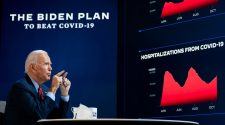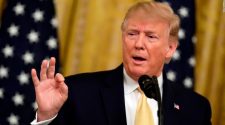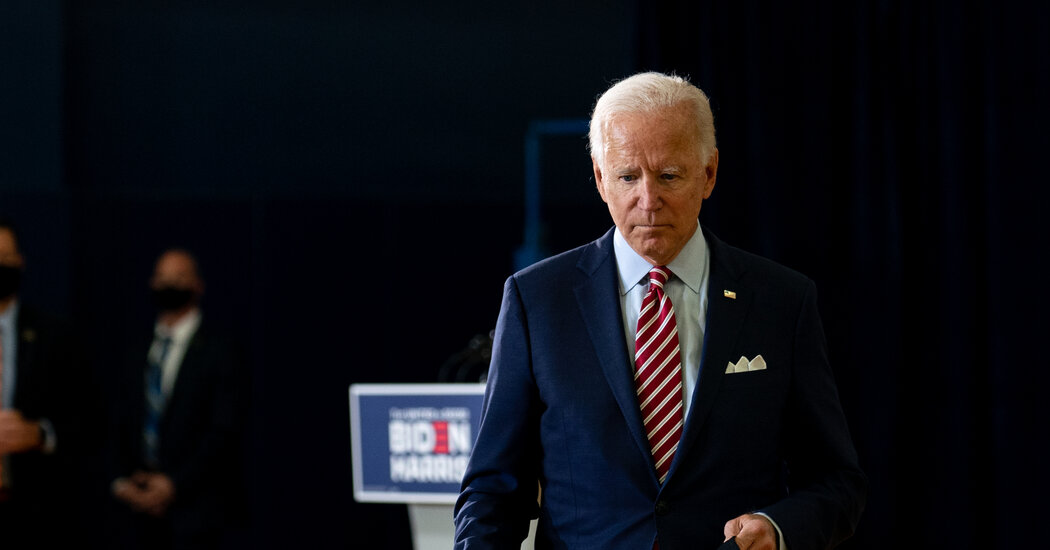For months Joseph R. Biden Jr. has condemned President Trump as a failed steward of the nation’s well-being, relentlessly framing the 2020 election as a referendum on the president’s handling of the coronavirus pandemic.
Now, confronted with a moment that many believe will upend the 2020 election — the death of Justice Ruth Bader Ginsburg and the prospect of a bitter Supreme Court confirmation battle — Mr. Biden’s campaign is sticking to what it believes is a winning strategy. Campaign aides said Saturday they would seek to link the court vacancy to the health emergency gripping the country and the future of health care in America.
While confirmation fights have long centered on hot-button cultural divides such as guns and especially abortion, the Biden campaign, at least at the start, plans to chiefly focus on protecting the Affordable Care Act and its popular guarantee of coverage for people with pre-existing conditions.
Arguments in a seminal case that could determine the future of the health care law are set for a week after Election Day, with the administration supporting a Republican effort to overturn it. Mr. Biden will accuse the president, as he already has, of trying to eliminate protections for pre-existing conditions during a pandemic, aides said, with the stakes heightened by a Supreme Court now short one of the liberal justices who had previously voted to keep the law in place.
Despite the Biden team’s confidence, the prospect of Mr. Trump’s appointing a third justice to the Supreme Court in his first term injects a highly volatile element into the race just six weeks before the election. Court battles have long been seen as greater motivation for Republican voters than for Democrats, though the record sums of money flooding into Democratic campaigns in the hours after Justice Ginsburg’s death offered progressives hope that they might be equally energized this time.
Still, Biden campaign officials said on Saturday that they did not see even a Supreme Court vacancy and the passions it will inevitably inflame as reason to fundamentally reorient the campaign’s approach. Mr. Biden has consistently led the president nationally and in polls of battleground states throughout the summer.
For Democrats, the focus on health care — overlaid by the pandemic — is a rerun of the successful playbook that helped power the party’s takeover of the House of Representatives in 2018 and a fidelity to Mr. Biden’s steadfast promise to defend Obamacare, a pledge that helped him navigate through the 2020 primary.
“This is a choice between a court that will defend your health care and take your health care away,” said Heidi Heitkamp, a former Democratic senator from North Dakota, who lost in 2018 after voting against Mr. Trump’s last Supreme Court nominee, Brett M. Kavanaugh.
“The winds have shifted on Obamacare,” she said, linking the law’s future to the coronavirus crisis. “The pandemic is about health care. So it’s a continuing of a discussion about health care and who’s the candidate most likely to protect you and your health care.”
The Biden campaign could also still seize on the uncertain future of abortion rights to mobilize younger voters, raising the specter of a Supreme Court tilted toward a 6-to-3 conservative majority.
“If you want something to fire up young people who weren’t all that interested this year, this is it,” John Anzalone, a pollster for Mr. Biden, said, noting that his research suggested that even apolitical young voters grasped abortion politics. “They know Roe v. Wade.”
Senator Chuck Schumer of New York, the Democratic leader, exhorted his Democratic colleagues to communicate the real-world stakes of a conservative-dominated court, urging them to make the case that another Trump pick would jeopardize the health law.
“Health care, protections for pre-existing conditions, women’s rights, gay rights, workers’ rights, labor rights, voting rights, civil rights, climate change and so much else is at risk,” Mr. Schumer told his colleagues, according to a person on the call.
Mr. Biden and Mr. Schumer were scheduled to speak late in the day. Mr. Biden himself had no events scheduled on Saturday and was expected to spend part of the next week preparing for the first debate, which will be held on Sept. 29.
Representative Alexandria Ocasio-Cortez of New York, a leader of the Democratic Party’s progressive wing, agreed with that approach. “It’s less about motivating people around a specific individual to be named to that court,” she said in an interview. “I think we are highly motivated about just making sure that vacancy is protected and preserved for the next president.”
“Right now,” she said of naming names, “the costs outweigh the benefits.”
The Biden campaign will have an unusually direct role in the confirmation fight through Senator Kamala Harris of California, Mr. Biden’s running mate, who stopped by the steps of the Supreme Court on Saturday morning. As a member of the Senate Judiciary Committee, Ms. Harris will serve as an interrogator for whomever Mr. Trump nominates. She has already shined in that role in some notable confrontations with past Trump appointees, including both of his attorneys general.
Mr. Biden’s advisers and allies believe that the political environment in the country has reversed years of conventional wisdom that court fights better mobilize conservatives than progressives. Democratic strategists said Mr. McConnell’s decision in 2016 to block President Barack Obama’s nomination of Judge Merrick B. Garland; the election of Mr. Trump; and clarifying court decisions on crucial issues involving immigration, gay rights and abortion had flipped that dynamic.
“Democrats should not approach this from a defensive posture,” said Guy Cecil, the leader of one of the party’s biggest super PACs, Priorities USA, noting that internal polling showed the court as the biggest motivating issue after a defeat of Mr. Trump. “Our goals of stopping this nomination and winning the election are aligned.”
Democratic donors poured unprecedented sums of money into campaigns and causes in the hours after Justice Ginsburg’s death was announced, donating about $80 million online in the first 24 hours.
An avowed institutionalist and former Judiciary Committee chairman himself, Mr. Biden won the Democratic primary campaign in part by ignoring some of loudest voices on the left.
Just this past week, the former vice president predicted in a CNN town hall that there would be “somewhere between six and eight Republicans who are ready to get things done” once Mr. Trump is gone. His instincts and his inclination to reach across the aisle, which has been pilloried by many on the left as naïve in this era of hyperpolarized politics, will be severely stress tested with the looming confirmation fight.
Some progressive groups are already mounting a pressure campaign on the Democratic Party and Mr. Biden to embrace adding new justices to the court as a countermeasure in 2021, presuming that the party seizes control of the White House and Senate in November.
Maurice Mitchell, the national director of the Working Families Party, urged Mr. Biden to say that he would “stop at nothing” to prevent a “hyperconservative court.”
“People ultimately want a fighter,” he said. “And this is an opportunity to demonstrate the fight that he has within him.”
Mr. Biden has previously said that he opposes court-packing. “We’ll live to rue that day,” he said last year.
Other Democrats said the battle was a chance for Mr. Biden to highlight his relationships and experience as a senator and vice president.
“This is the time,’’ said Leah D. Daughtry, a veteran Democratic strategist, “for all his life experience, his knowledge, his relationships to come together in how he is strategically navigating this nomination process.”
Jonathan Martin, Rebecca R. Ruiz and Glenn Thrush contributed reporting.
















